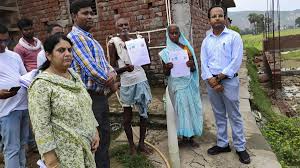Supreme Court to hear pleas challenging Bihar electoral rolls revision on July 10

New Delhi, July 7, 2025 — The Supreme Court will hear several petitions on July 10 challenging the Election Commission’s special revision of voter rolls in Bihar. The case raises serious concerns about voter rights, just months before the state heads to Assembly elections.
The petitions question whether the revision process follows the law and protects citizens’ constitutional rights.
What Sparked the Controversy?
On June 24, the Election Commission (EC) began a Special Intensive Revision (SIR) of Bihar’s electoral rolls. Officials claimed this update was necessary to remove duplicate entries, migrants who moved away, and ineligible voters.
However, the process targets those added to the voter list after 2003. These individuals must now fill out a new enumeration form and provide citizenship proof. Documents like Aadhaar cards, ration cards, or voter IDs are not accepted. This change has triggered widespread criticism.
Who Filed the Petitions?
Many public figures and rights groups have approached the Supreme Court. The petitioners include:
- Manoj Jha (RJD MP)
- Mahua Moitra (TMC MP)
- Mujahid Alam, former MLA
- Activist Yogendra Yadav
- Organizations like ADR and PUCL
They argue that the EC’s order violates Articles 14, 21, 325, and 326 of the Constitution. These articles guarantee equality, personal liberty, and the right to vote without discrimination.
According to the petitioners, the EC has unfairly shifted the burden of proving citizenship onto voters. They believe the process lacks legal authority and could disenfranchise millions.
Why Are Experts Concerned?
Critics point to both timing and implementation flaws.
1. Close to Elections
The EC has launched the revision just months before elections, leaving voters with little time to respond. The deadline for submitting documents is July 25.
2. Citizenship Proof Requirements
Many people lack passports or land papers. If Aadhaar or voter ID aren’t accepted, countless eligible voters—especially migrants, women, Dalits, and religious minorities—could lose their voting rights.
3. Monsoon Season
Bihar faces heavy monsoon rains during July. People in flood-prone areas or remote villages may struggle to complete the paperwork in time.
4. Legal Gaps
The EC has not clarified the legal framework behind this move. Critics say this could turn into a silent form of voter suppression.
EC’s Justification
The Election Commission claims the revision ensures clean and accurate voter lists. Officials say the effort will prevent fraud and maintain electoral integrity.
The EC also says that similar clean-up drives have taken place in the past. However, many question why such a large-scale exercise is happening without proper public consultation.
The commission insists it is acting within the law. But it has not explained why it excluded commonly used documents like Aadhaar.
Political Response
Opposition parties have strongly condemned the EC’s move. Leaders from the Congress, RJD, TMC, CPI(M), and others say the revision is designed to suppress certain communities.
Mahua Moitra called it “bureaucratic harassment disguised as reform.” Digvijaya Singh of Congress said the EC’s approach is “impractical and unjust.”
Civil society groups echoed these concerns. They warned that lakhs of voters could be dropped from the rolls without fair notice or explanation.
What Happens on July 10?
A bench led by Justices Sanjiv Khanna and Sudhanshu Dhulia will hear the matter. The court may issue interim relief or order the EC to pause the process.
Legal experts believe this case could set a national precedent. If the court rules against the EC, similar voter verification drives in other states might face restrictions.
Why This Case Matters
This legal battle goes beyond Bihar. At stake is the right to vote—one of India’s most basic democratic freedoms.
The outcome will decide whether voters must now prove citizenship before casting a ballot. It will also test how far election officials can go when updating voter rolls.
With elections near and millions affected, the Supreme Court’s decision will be closely watched.






